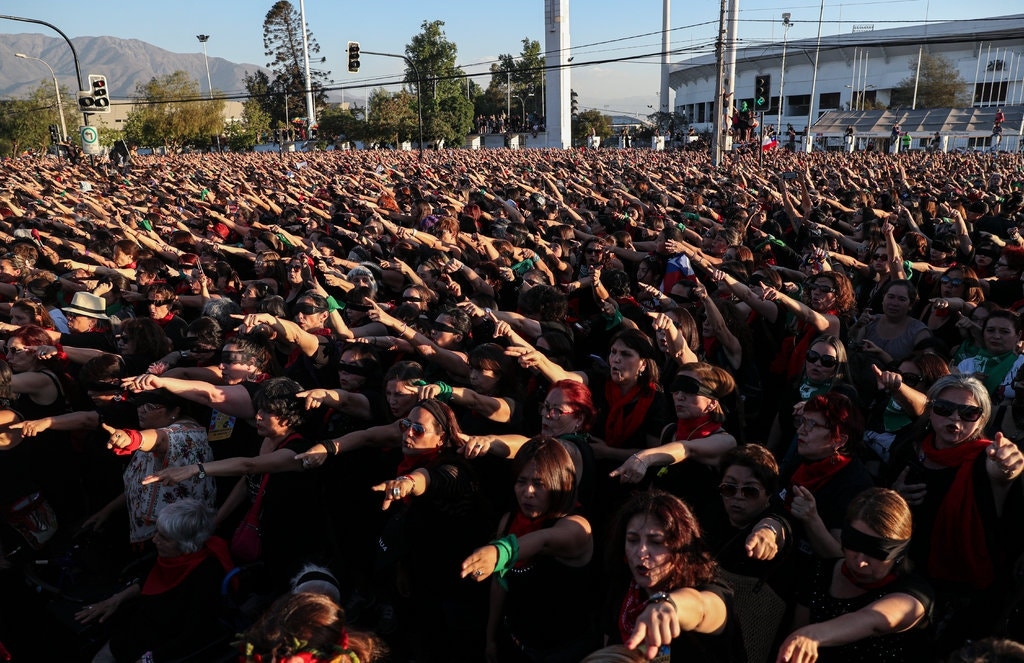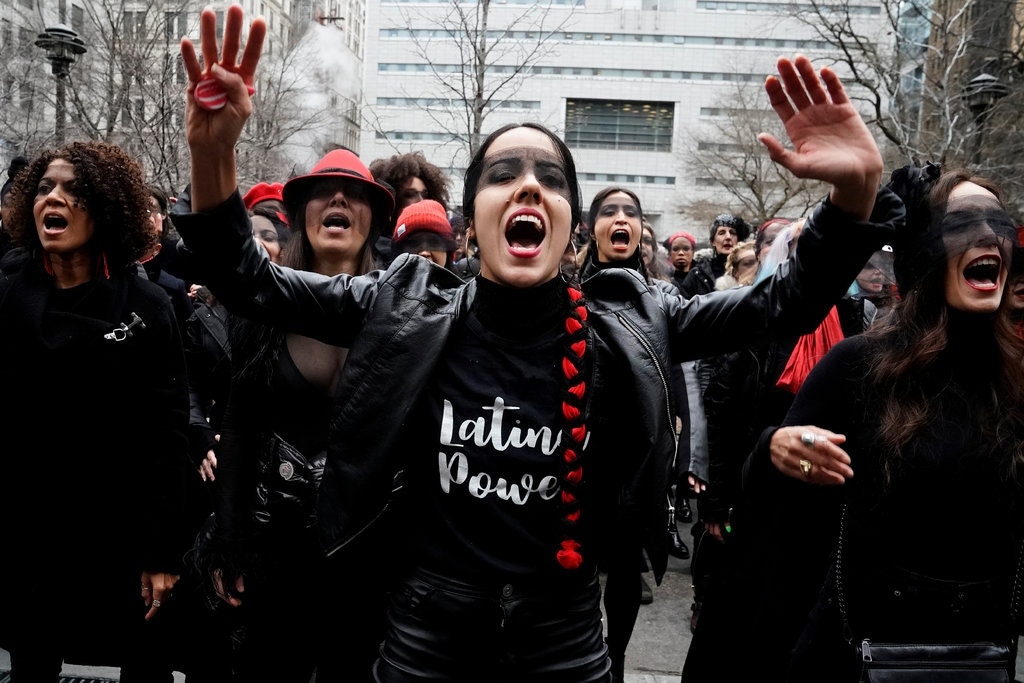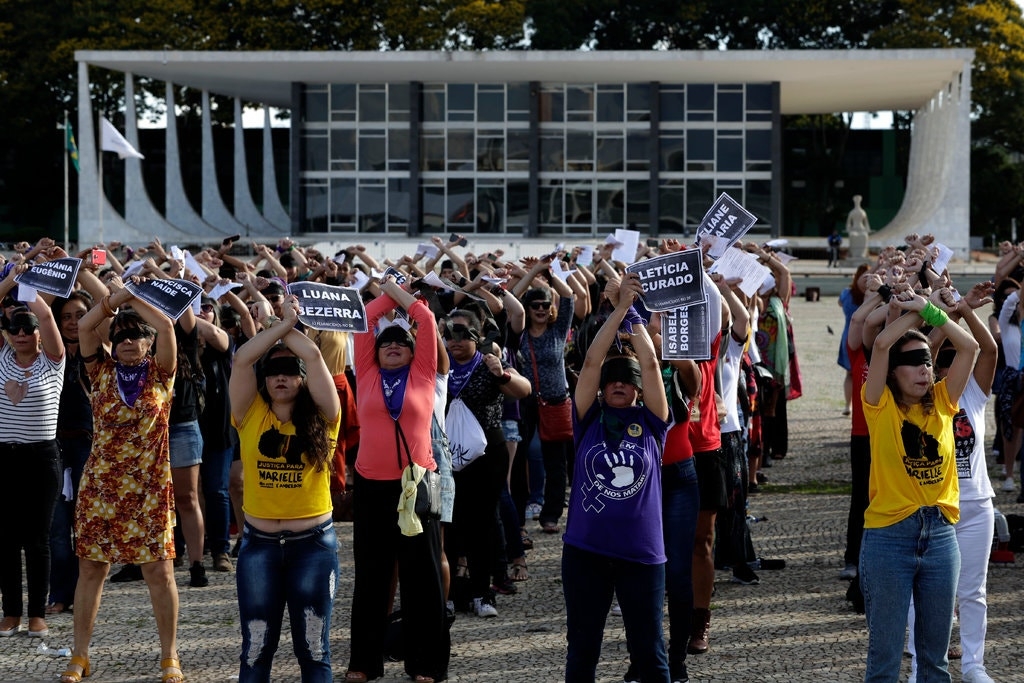
Women in Chile, Brazil, Argentina and elsewhere know: Stopping violence against women starts with politics and power.
The New York Times
Jan. 29, 2020
by Vanessa Barbara
Contributing Opinion Op-ed Writer
SÃO PAULO, Brazil — During the jury selection process for Harvey Weinstein’s criminal trial this month, dozens of women gathered outside a Manhattan courthouse to perform a version of the dance/chant known as “Un violador en tu camino,” or “A Rapist in Your Path.” First in Spanish, then in English, they sang: “Patriarchy is our judge that imprisons us at birth/And our punishment is the violence you don’t see.”
This performance, which quickly went viral, was created last year by the feminist collective Lastesis in Valparaíso, Chile, and is based on the work of the Argentine-Brazilian anthropologist Rita Segato. The lyrics describe how the state upholds systematic violations of women’s rights, through institutions such as the judiciary and the police. It’s not just that members of those institutions simply disregard the complaints — looking the other way, doubting the victims — but that they are often the perpetrators themselves. “This oppressive state is a macho rapist,” the chant goes.
“Un violador en tu camino” was first performed in front of a police station by a small group during a protest in Valparaíso on Nov. 20. It was then repeated five days later in the capital, Santiago, by hundreds of activists on the International Day for the Elimination of Violence Against Women. In early December, a group of thousands sang the anthem together outside Santiago’s National Stadium, which was a detention and torture center during Chile’s military dictatorship. (In one verse, the song mentions the “disappearance” of women.)
From there, it has spread all over the world: London, Berlin, Paris, Madrid, Barcelona, Tel Aviv, New Delhi, Tokyo, Beirut, Istanbul, Mexico City, Caracas, Lima, Buenos Aires, among other places. In Manhattan, according to The Associated Press, it caused “a commotion so loud that it could be heard in a 15th-floor courtroom.”

The choreographed dance begins with a driving drum beat, as the women do a side-to-side movement and stomp out the rhythm with their feet. Many verses speak universally about the violence against women: They mention rape, femicide, impunity for the killers. “And it’s not my fault, not where I was, not how I dressed,” they shout, as if collectively rebuffing the same old forms of victim-blaming.
But the performance also carries strong local elements that might go unnoticed by the broader public. One verse sarcastically quotes the Chilean police anthem word for word: “Sleep calmly, innocent girl/ Without worrying about the bandit,/ Over your dreams smiling and sweet,/ watches your loving police.” The title, “A Rapist in Your Path,” is also an ironic appropriation of an old slogan used by the national police, “a friend in your path.”
The performance also makes references to police abuse in Chile, and by extension in neighboring countries. Part of the choreography includes squatting down, hands behind the head, a common search procedure still performed in many Latin American countries: Police officers and prison wardens often force women — sometimes even children — to squat, naked, in order to do a body cavity search.
The activists wear a black lace blindfold as a symbol of the often invisible ways that women are made vulnerable, but also as a nod to the hundreds of protesters who were partly blinded by the Chilean police in the past three months. (Since the beginning of the demonstrations, Chilean’s National Human Rights Institute has filed 1,080 lawsuits against the state, 770 for allegations of torture and inhumane treatment and 158 for sexual abuse, including four rapes.)
In Latin American countries, women performing the song also wear pañuelos verdes — the green scarves symbolizing the campaign for legal abortion. (The use of green scarves as an abortion-rights emblem derives from the white scarves carried by the Madres de Plaza de Mayo, whose children disappeared during Argentina’s military dictatorship.)
But “Un violador en tu camino” is way more than its Latin American specificities. This is why it has spread so far and so quickly. It speaks about something that is true in too many countries — not only Chile, Argentina or Brazil. “The rapist is you,” the women repeat here and everywhere, either pointing to a courthouse, to the police headquarters or to the presidential palace. They mean that violations against women are not isolated events, not merely connected to interpersonal relations, but rather, essentially political. Activists point a finger at institutions that facilitate gender-based violence by systematically dehumanizing women and promoting ideologies to keep them under control.
For proof that this is really a global political issue, look to Turkey, where the police broke up a performance of the song in Istanbul and confiscated the activists’ megaphone. Six women were arrested for supposedly insulting the president and degrading the institutions of the state. In a separate incident, courts issued arrest warrants for 25 women who protested in Izmir, while nine were detained. “Turkey has become the only country where one has to have immunity to stage this protest,” said a lawmaker, Sera Kadigil, as she and other colleagues staged a version of the protest in the parliament.
It should come as no surprise that female representatives make up only 17 percent of the Turkish parliament and 11.8 percent of the ministerial positions. The country ranks 130th out of 153 countries in the World Economic Forum’s Global Gender Gap Report for 2020.

Here in Brazil, we face similarly depressing statistics. Activists here have added a couple of verses to the lyrics of “Un violador,” saying: “Marielle is present. Her killer is a friend of our president.” These refer to Marielle Franco, a Brazilian City Council member who was assassinated in 2018, and to the fact that President Jair Bolsonaro has ties to both of the suspects in the killing. (The investigation is ongoing.) In Brazil, women occupy 15 percent of the lower house seats and 9 percent of ministerial positions.
“It’s the cops. It’s the judges. It’s the system. It’s the president. The rapist is you.”
According to the 2020 Global Gender Gap Report, the largest gender disparity in the world still lies in the sphere of political empowerment. I dare say that’s where everything else begins. Only 25 percent of the 35,127 global parliamentary seats are taken up by women, a figure that drops to only 21 percent at the ministerial level. In nine of the 153 countries the forum examines, women are not represented at all. Over the past 50 years, 85 countries have had no female head of state.
It is no wonder that women from Chile, where the song was created, are demanding gender parity for a forthcoming constitutional convention. There will be no justice for women as long as we are kept out of the political process. There won’t be any hope of equality. The rapists will continue while most of us stand powerless outside courthouses, police stations and presidential palaces, furiously pointing at them, to no avail.
Vanessa Barbara is the editor of the literary website A Hortaliça, the author of two novels and two nonfiction books in Portuguese, and a contributing opinion writer.
A version of this article appears in print on Jan. 29, 2020, Section A, Page 27 of the New York edition with the headline: A Feminist Performance Goes Global.

